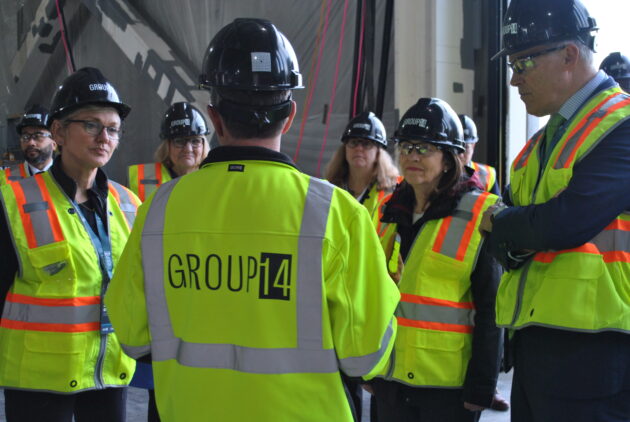
Group14 Technologies announced today that it has received a $200 million grant to build a plant that will produce silane gas, an essential ingredient for manufacturing its next-generation battery materials.
The startup will build and operate the silane facility in Moses Lake, the same Eastern Washington town where it’s currently constructing its BAM-2 factory. The factory, which should start production before the end of the year, is anticipated to become the world’s largest manufacturer of a patented silicon-carbon battery material.
“This federal investment affirms that the State of Washington is leading the way on advanced battery manufacturing,” Sen. Maria Cantwell (D-Wash.) said in a statement.
The new funding was allocated by Congress in the Bipartisan Infrastructure Law and awarded by the U.S. Department of Energy. Cantwell was a proponent of battery programs contained in the law.
The DOE grant supports the Biden administration’s goal of strengthening U.S. battery production, which over the years has become largely outsourced to foreign countries. That effort includes bolstering the supply chain of raw materials such as silane.
Group14 and others use silane to make silicon battery materials that replace the graphite traditionally used in the anode of lithium batteries. Group14 reports that its technology can increase a battery’s power by up to 50% and provide faster charging. Higher performing batteries are in demand for everything from personal electronics to electric cars to aircraft and semi-trucks.
But most of the world’s silane currently is made in China, said Group14 CEO Rick Luebbe.

“The challenge is domestically produced silane,” Luebbe said in an interview with GeekWire. “There’s plenty of silane out there, but we know we want to establish a domestic supply chain. And also with the volumes we’re talking about, it really makes sense to have the production colocated [with battery material manufacturing].”
Fellow battery startups Sila and OneD Battery Sciences are also erecting manufacturing sites in Moses Lake. The three companies were originally drawn to the area in large part for its proximity both to affordable clean energy and to REC Silicon, the only U.S. company producing silane.
However, two years ago the solar panel maker Hanwha Solutions became the largest shareholder of REC Silicon. It has since made a deal to take the majority of the silicon being produced by the Moses Lake site, leaving an insufficient supply for battery materials companies.
The Group14 silane plant will have an annual capacity of 7,200 metric tons. The company will need 2,400 tons to meet its needs once BAM-2 is completed. It will sell the surplus gas to others. It’s expected to take a couple of years to build the silane facility and get it running.
Group14 and Sila previously each received $100 million grants from the Bipartisan Infrastructure Law to support their manufacturing efforts in Moses Lake.

The new project marks Group14’s second foray into silane production. Last year it purchased Schmid Silicon Technology Holding, and the companies have been working to restart Schmid’s silane gas plant in southeast Germany. Luebbe said the site should start operating in another year.
Group14 has plans to establish a silicon battery material factory in Europe, but has not settled on a specific location. It will likely be near the Schmid facility.
Group14 this week also shared that its manufacturing factory in South Korea, which is a joint venture with electronics company SK materials, has been commissioned. That makes it the first large-scale silicon battery material factory in the world, Luebbe said.
The startup has sent its anode material from South Korea to 100 of its customers to validate its performance.
Luebbe predicted that it could start going into EV batteries by the end of next year.
“This is the tipping point, from my perspective,” he said. “This is the beginning of the silicon battery era.”




